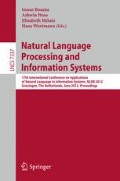Abstract
Product reviews have been the focus of numerous research efforts. In particular, the problem of identifying fake reviews has recently attracted significant interest. Writing fake reviews is a form of attack, performed to purposefully harm or boost an item’s reputation. The effective identification of such reviews is a fundamental problem that affects the performance of virtually every application based on review corpora. While recent work has explored different aspects of the problem, no effort has been done to view the problem from the attacker’s perspective. In this work, we perform an analysis that emulates an actual attack on a real review corpus. We discuss different attack strategies, as well as the various contributing factors that determine the attack’s impact. These factors determine, among others, the authenticity of fake review, evaluated based on its linguistic features and its ability to blend in with the rest of the corpus. Our analysis and experimental evaluation provide interesting findings on the nature of fake reviews and the vulnerability of online review-corpora.
Access this chapter
Tax calculation will be finalised at checkout
Purchases are for personal use only
Preview
Unable to display preview. Download preview PDF.
References
http://en.wikipedia.org/wiki/flesch_kincaid_readability_test
http://www.wellesleywinepress.com/2011/09/on-5-star-system-and-100-point-scale.html
Dellarocas, C.: Immunizing online reputation reporting systems against unfair ratings and discriminatory behavior. In: EC 2000, pp. 150–157. ACM, New York (2000)
Ding, X., Liu, B., Yu, P.S.: A holistic lexicon-based approach to opinion mining. In: WSDM 2008, pp. 231–240. ACM, New York (2008)
Duan, W., Gu, B., Whinston, A.B.: Do Online Reviews Matter? - An Empirical Investigation of Panel Data. Social Science Research Network Working Paper Series (November 2004)
Flesch, R.: A new readability yardstick. J. Appl. Psychol. 32, 221–224 (1948)
Flesch, R.: The Art of Readable Writing. Harper and Row (1949)
Hankin, L.: The effects of user reviews on online purchasing behavior across multiple product categories. PhD thesis (2007)
Hu, M., Liu, B.: Mining and summarizing customer reviews. In: KDD 2004, pp. 168–177. ACM, New York (2004)
Jindal, N., Liu, B.: Analyzing and detecting review spam. In: ICDM, pp. 547–552 (2007)
Jindal, N., Liu, B.: Review spam detection. In: WWW 2007, pp. 1189–1190. ACM, New York (2007)
Jindal, N., Liu, B.: Opinion spam and analysis. In: WSDM 2008, pp. 219–230. ACM, New York (2008)
Jindal, N., Liu, B., Lim, E.-P.: Finding unusual review patterns using unexpected rules. In: CIKM 2010, pp. 1549–1552. ACM, New York (2010)
Korfiatis, N., Rodríguez, D., Sicilia, M.-Á.: The Impact of Readability on the Usefulness of Online Product Reviews: A Case Study on an Online Bookstore. In: Lytras, M.D., Damiani, E., Tennyson, R.D. (eds.) WSKS 2008. LNCS (LNAI), vol. 5288, pp. 423–432. Springer, Heidelberg (2008)
Lappas, T., Gunopulos, D.: Efficient Confident Search in Large Review Corpora. In: Balcázar, J.L., Bonchi, F., Gionis, A., Sebag, M. (eds.) ECML PKDD 2010, Part II. LNCS, vol. 6322, pp. 195–210. Springer, Heidelberg (2010)
Lim, E.-P., Nguyen, V.-A., Jindal, N., Liu, B., Lauw, H.W.: Detecting product review spammers using rating behaviors. In: CIKM 2010, pp. 939–948. ACM, New York (2010)
Mackiewicz, J.: Reviewer motivations, bias, and credibility in online reviews. In: Kelsey, S., Amant, K.S. (eds.) Handbook of Research on Computer Mediated Communication, pp. 252–266. IGI Global (2008)
Mukherjee, A., Liu, B., Wang, J., Glance, N.S., Jindal, N.: Detecting group review spam. In: WWW (Companion Volume), pp. 93–94 (2011)
O’Mahony, M.P., Smyth, B.: Using readability tests to predict helpful product reviews. In: RIAO 2010, Paris, France, pp. 164–167 (2010)
Pang, B., Lee, L.: Opinion mining and sentiment analysis. Found. Trends Inf. Retr. 2, 1–135 (2008)
Park, D.-H., Lee, J., Han, I.: The effect of on-line consumer reviews on consumer purchasing intention: The moderating role of involvement. Int. J. Electron. Commerce 11(4), 125–148 (2007)
Popescu, A.-M., Etzioni, O.: Extracting product features and opinions from reviews. In: HLT 2005, pp. 339–346. Association for Computational Linguistics, Stroudsburg (2005)
Reinstein, D.A., Snyder, C.M.: The influence of expert reviews on consumer demand for experience goods: A case study of movie critics. Journal of Industrial Economics 53(1), 27–51 (2005)
Tsaparas, P., Ntoulas, A., Terzi, E.: Selecting a comprehensive set of reviews. In: KDD, pp. 168–176 (2011)
Wang, G., Xie, S., Liu, B., Yu, P.S.: Review graph based online store review spammer detection. In: IEEE International Conference on Data Mining, pp. 1242–1247 (2011)
Wu, G., Greene, D., Smyth, B., Cunningham, P.: Distortion as a validation criterion in the identification of suspicious reviews. Technical report (2010)
Zhuang, L., Jing, F., Zhu, X.-Y.: Movie review mining and summarization. In: CIKM 2006, pp. 43–50. ACM, New York (2006)
Author information
Authors and Affiliations
Editor information
Editors and Affiliations
Rights and permissions
Copyright information
© 2012 Springer-Verlag Berlin Heidelberg
About this paper
Cite this paper
Lappas, T. (2012). Fake Reviews: The Malicious Perspective. In: Bouma, G., Ittoo, A., Métais, E., Wortmann, H. (eds) Natural Language Processing and Information Systems. NLDB 2012. Lecture Notes in Computer Science, vol 7337. Springer, Berlin, Heidelberg. https://doi.org/10.1007/978-3-642-31178-9_3
Download citation
DOI: https://doi.org/10.1007/978-3-642-31178-9_3
Publisher Name: Springer, Berlin, Heidelberg
Print ISBN: 978-3-642-31177-2
Online ISBN: 978-3-642-31178-9
eBook Packages: Computer ScienceComputer Science (R0)

